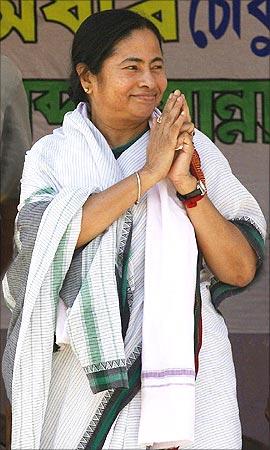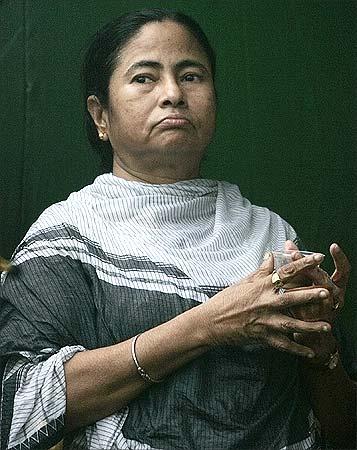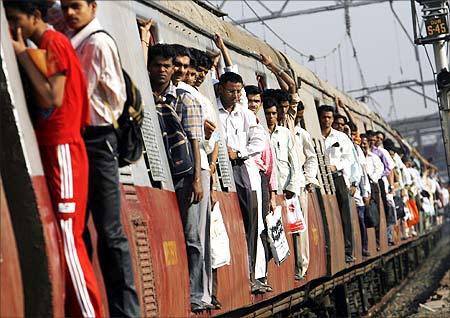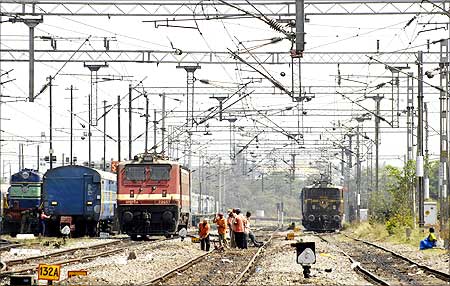
She is strong, aggressive, determined and fearless. Now, at the helm of one of India's most enterprising ministries, she promises the best service from the Indian Railways.
Meet Mamata Baneerjee, the firebrand Trinamool Congress chief from West Bengal who makes headlines for the right and wrong reasons.
Promising to bring out the 'human face' of the Railways, Mamata will present her third Railway Budget on July 1. After getting into a tough scrap with the Tatas over the Tata Nano plant at Singur in West Bengal, she has made a strong comeback to the national politics. Her protests at Singur against land acquisition by Tata Motors made the Tatas take the project out of West Bengal to Gujarat.
Her temperamental nature and big demands have made her a tough ally, but Mamata has a lot more clout on the national scene than before with the Trinamool Congress bagging 19 Lok Sabha seats in the recently concluded elections. The Congress-led United Progressive Alliance government needs her support to keep the show going.
A politician with an authoritarian style of functioning, she is steadfast on what she wants to do. She has already sent a list of demands to the government. Political observers feel that the Congress will have a tough time dealing with her.
Will she replicate Lalu's magic to strengthen the Railways? What does she plan to do? A new journey has just begun for Mamata Banerjee...

Mamata's tryst with politics began in the 1970s when she joined the Congress. In the 1984 general elections, she became one the youngest members in Parliament beating Communist leader Somnath Chatterjee's record.
She also became the general secretary of the All India Youth Congress. She lost her seat in 1989 but was re-elected in the 1991 general elections.
She retained the Kolkata South seat in the 1996, 1998, 1999, 2004 and 2009 general elections. In 1997, Mamata Banerjee split the Congress party in West Bengal and established the All India Trinamool Congress. In 1999, she joined the Bharatiya Janata Party-led National Democratic Alliance government as the railway minister.
In 2001, after parting ways with the BJP, she moved out of the Cabinet. She then joined hands with the Congress party for West Bengal's 2001 elections.
She returned to the Cabinet in January 2004, holding the Ministry of Coal and Mines portfolio till 2004.
The 54-year-old Mamata won from the Kolkata South constituency this time, in one of the best performances by an opposition party in West Bengal.

Mamata Banerjee first became the Railway Minister in 1999. She presented two Railway Budgets 2000 and 2001, in which passenger fares were not hiked.
During her stint, railway transport was opened to private players. The credit for creating the first-ever joint venture between the Railways and the private sector PRCL (Pipavav Railway Corporation Ltd) goes to Mamata.
In a people-friendly Railway Budget announced in 2001, Mamata announced free travel for students up to Class X and to girl students up to class XII, 75 per cent travel concession to Kargil widows in second and sleeper classes.
Freedom fighters were offered a concessional a trip on Rajdhani or Shatabdi. She announced that Railways would start bookings on the Internet through smart cards and start Internet-based reservation using credit cards.
She introduced several new trains to her home state. She also increased the frequency of some trains as per the demands of the people of West Bengal.
To promote tourism, she allocated more locomotives for Darjeeling-Himalayan and proposed the setting up of the Indian Railway Catering and Tourism Corporation Limited. She also stressed the need for rail links between Bangladesh and Nepal.
She introduced 19 new trains during the 2000-2001 fiscal year. Many criticised her for her bias to her home state.
When asked if she would focus on Bengal, she said her focus would be the entire country and not just her state.
So will the Railway Minister make people across India happy this time?

With former Railway Minister Lalu Prasad's success stories of turning around the loss-making behemoth doing the rounds in the hallowed portals of the Indian Institute of Management and the Harvard Business School, Mamata has a tough job of living up to the expectations of the people. In the last Railway Budget, Lalu had cut fares and introduced more new trains.
However, much more needs to be done to modernise and develop the railway network and make travel more comfortable and safe for passengers.
While Lalu worked well to generate more revenues for the Railways, Mamata's main focus is passenger comfort.
She has promised to modernise the rail network. She has announced special monthly passes at Rs 20 for those with monthly income below Rs 500, besides a new train for West Bengal.
In the Budget, she may revoke the order by her Lalu Prasad on issuance of lifetime complimentary passes to Railway Ministers. An order dated May 19 from the Railway Board had stated that a former Railway Minister would get a First Class air-conditioned complimentary card pass for himself with three companions in the same class.
"Allowing one or two companions is okay. Issuing four free passes would rob the common man of berths," Mamata said. One attendant would also get a ticket in the second air-conditioned class as per the order.
She has also promised to complete the work on the east-west freight corridor between Ludhiana and Howrah in a record time to boost economic activities across Delhi, Uttar Pradesh, Punjab, Bihar and Bengal.
"It is a social obligation we have to fulfill for the humanity. We will try to give economy freedom to these sections for train travel," Banerjee said.

Potable water and clean toilets inside trains and clean stations will be given priority.
The Railways will also measures to improve tourism. All pending railway projects in Jammu and Kashmir will be given special care.
Mamata has already asked officials to maintain cleanliness and punctuality.
She also plans to improve the quality of food served in trains. She also plans to offer regional cuisine on Rajdhani trains.
The Indian Railway Catering and Tourism Corporation has already introduced a common recipe book to be used by all private caterers. The recipe book will be issued to the approximately 100 base kitchens across the country to ensure that there is a standardisation of food across trains in the country.
Indian Railways is also planning to set up a Rs 100-crore (Rs 1-billion) high-axle load wagon trolley factory in collaboration with the United States in West Bengal.

In a letter to all the 1.4 million employees of the Indian Railways, Mamata urged them to offer service with a smile.
"The Railways are committed to protecting and nurturing commercial interests, but it has to be done with a human face," her letter said. She also asked for suggestions on how to improve performance.
Banerjee added that special attention would be given to Jammu and Kashmir and the development of railway network in the state.
With increasing number of complaints against the supply of unhygienic linens in trains, the Railways are also planning to set up laundry units.